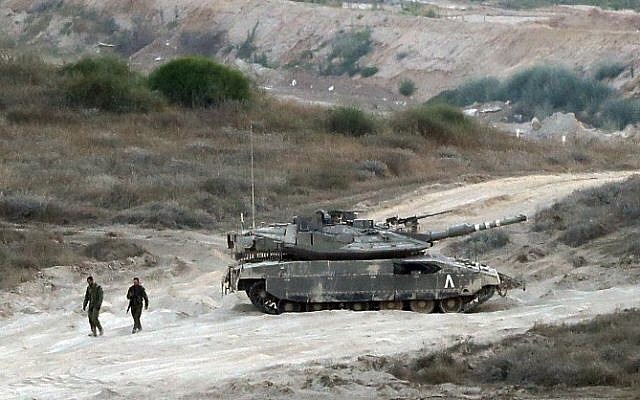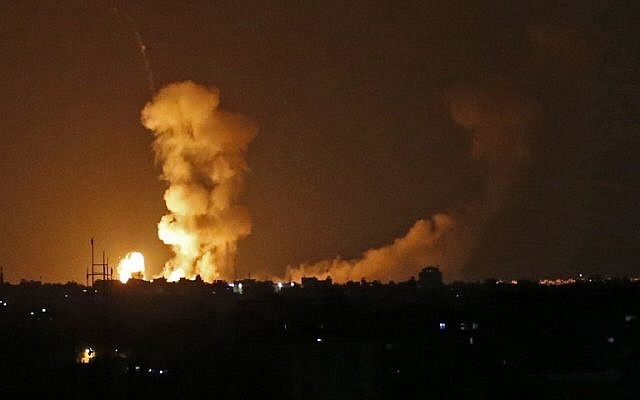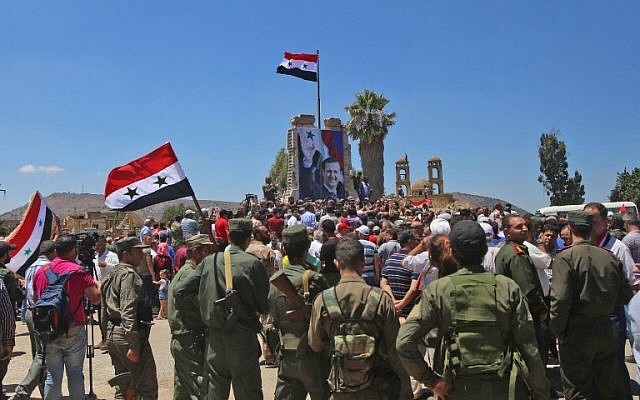
Most Israeli Jews back large-scale Gaza offensive if ceasefire fails
Survey finds Israelis split on Assad's recent advances near northern border, but almost all support providing humanitarian aide to Syrian refugees
By TOI staff
31 Jul 2018, 10:23 pm
Nearly two-thirds of Jewish Israelis think Israel should launch a large-scale military offensive in the Gaza Strip if its Hamas rulers do not abide by the latest ceasefire agreement, a poll released Tuesday found.
The results, published by the Israel Democracy Institute as part of its monthly Peace Index, also found that Arab and Jewish Israelis were divided on whether the Syrian regime’s recent military advances were a positive development for the Jewish state.
According to the poll, 61 percent of Jewish Israelis think the IDF should launch a military operation in Gaza if the cross-border arson attacks from the Hamas-run coastal enclave continue.
Support for an extensive military offensive was higher among respondents who identified as right-wing, with 75% supporting the move.
In contrast, 69% of Arab Israelis opposed a large-scale Israeli military response to the recent flare-up in violence in the coastal enclave, with only 16% indicating support for it.
The poll comes amid months of near-weekly violent border protests and ongoing cross-border arson attacks organized by Gaza’s Hamas rulers. The kites and balloons carrying incendiary devices launched into Israeli territory have burned thousands of acres of farmland and caused millions of shekels in damage.

A Palestinian protester displays a kite loaded with an incendiary device before launching it towards Israel, east of Rafah in the southern Gaza Strip, on June 29, 2018. (Abed Rahim Khatib/Flash90)
The confrontations have at times spiraled into military exchanges, with Palestinians firing dozens of rockets at southern Israeli towns and the army launching air strikes on Hamas positions in Gaza.
Israeli politicians and IDF officials have repeatedly warned Hamas that the continued violence could see a large-scale military response. Earlier in July, the IDF was reportedly instructed to prepare for an offensive in Gaza if the cross-border arson attacks continued.
After an IDF solider was killed by sniper fire along the Gaza border earlier this month, Israel unleashed an offensive it says destroyed more than 60 Hamas targets, including three battalion headquarters. Hamas said three of the four people killed in the strikes were their fighters.
The ruling terror group later declared an unofficial ceasefire, though sporadic violence has continued along the border.
Over the weekend, the United Nations envoy for Middle East peace met with Egyptian Foreign Minister Sameh Shoukry and other officials in a bid to calm the violent flare-up.
Nickolay Mladenov is reportedly pushing a ceasefire proposal in cooperation with Egypt and other Arab states, according to the Haaretz daily.
Mladenov’s arrangement would see Israel remove recent restrictions on the Kerem Shalom crossing for goods into Gaza, and the sides agreeing to a ceasefire which would include the cessation of airborne arson attacks, Haaretz said, citing Egyptian media.

A picture taken on July 20, 2018, shows the explosions from an Israeli bombardment in Khan Younis in the southern Gaza Strip. (AFP Photo/Said Khatib)
The Peace Index published Tuesday also found that Jewish and Arab Israelis are divided on whether Syrian President Bashar Assad’s recent military victories were a positive development for the Jewish state.
Some 43.5% of Jewish Israelis said the Russian-backed regime advances against the Islamic State and rebel strongholds aligned with national interests, while 34% said it did not. 38% of Arab Israelis said Assad’s recent successes were a positive development for Israel, while 33.5% said they were not.
On Monday, the Syrian government regained control of southern provinces bordering Israel for the first time in seven years, after Islamic State-linked militants gave up their last pocket of territory in the area.
Israel has largely kept to the sidelines of the Syrian civil war, but has said it will not allow Iran or Hezbollah to establish a permanent military presence near its northern border.
According to the Peace Index, Jewish and Arab Israelis were in agreement that Israel should continue providing victims of the Syrian civil war with humanitarian aid, at 78% and 75% respectively.

Syrian troops raise the Syrian flag in the border town of Quneitra in the Syrian Golan Heights on July 27, 2018. (AFP Photo/Youssef Karwashan)
Earlier on Tuesday, Channel 10 reported Israel has halted its massive, multi-faceted humanitarian relief operation providing Syrians with life-saving services, closing its border to fleeing civilians seeking medical care, amid the regime offensive in the border area.
The decision marks the first time that the border will be completely closed to any Syrian civilians since Operation Good Neighbor was initiated five years ago. Officials told the TV station the program was not permanently discontinued, and could resume pending the outcome of the Syrian government offensive.
The Peace Index also asked respondents about the controversial new nation-state law that has been criticized as discriminatory against the country’s minorities.
The poll found that 52% of Jewish Israelis said it was necessary to pass the law “at this time.” The legislation for the first time enshrines the country as the nation-state of the Jewish people and downgrades the Arabic language from official to “special” standing.
The majority of Jewish Israelis (60%) further said the legislation that amends Israel’s basic laws should have “addressed the issue of equality.”
Unsurprisingly, the vast majority of Arab Israelis (84%) opposed the law, saying legislating Israel as a Jewish state at this time was unnecessary.
The monthly Peace Index poll compiled the responses of 600 Israeli adults, and had a margin of error of +- 4.1%.
No comments:
Post a Comment